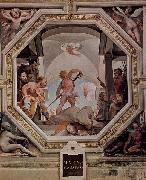China al por mayor de Marco de Oleo |
|||||||||||

|
|||||||||||
|
|
|
||||||||||||||
|
Domenico di Pace Beccafumi
(1486?CMay 18, 1551) was an Italian Renaissance-Mannerist painter active predominantly in Siena. He is considered one of the last undiluted representatives of the Sienese school of painting. Domenico was born in Montaperti, near Siena, the son of Giacomo di Pace, a peasant who worked on the estate of Lorenzo Beccafumi. Seeing his talent for drawing, Lorenzo adopted him, and commended him to learn painting from Mechero, a lesser Sienese artist. In 1509 he traveled to Rome, but soon returned to Siena, and while the Roman forays of two Sienese artists of roughly his generation (Il Sodoma and Peruzzi) had imbued them with elements of the Umbrian-Florentine Classical style, Beccafumi's style remains, in striking ways, provincial. In Siena, he painted religious pieces for churches and of mythological decorations for private patrons, only mildly influenced by the gestured Mannerist trends dominating the neighboring Florentine school. |
||||||||||||||
|
|
||||||||||||||
|
||||||||||||||
|
|
||||||||||||||
| Domenico di Pace Beccafumi
(1486?CMay 18, 1551) was an Italian Renaissance-Mannerist painter active predominantly in Siena. He is considered one of the last undiluted representatives of the Sienese school of painting. Domenico was born in Montaperti, near Siena, the son of Giacomo di Pace, a peasant who worked on the estate of Lorenzo Beccafumi. Seeing his talent for drawing, Lorenzo adopted him, and commended him to learn painting from Mechero, a lesser Sienese artist. In 1509 he traveled to Rome, but soon returned to Siena, and while the Roman forays of two Sienese artists of roughly his generation (Il Sodoma and Peruzzi) had imbued them with elements of the Umbrian-Florentine Classical style, Beccafumi's style remains, in striking ways, provincial. In Siena, he painted religious pieces for churches and of mythological decorations for private patrons, only mildly influenced by the gestured Mannerist trends dominating the neighboring Florentine school. The beheading of Spurius Cassius, fresco (1532-1535, ', ', ', ', ', ', ', '), Palazzo Pubblico, Siena |
||||||||||||||
|
Related Paintings to Domenico di Pace Beccafumi :. |
||||||||||||||
|
|
||||||||||||||
|
|
||||||||||||||
|
CONTACTE EEUU |







